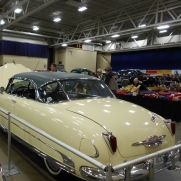lead

snowshoe90aolcom
Expert Adviser
in HUDSON
I just read the "is it me or....." discussion a few topics down and realize most all topics have been talked about at one time or another so I'll throw this one out there for the fun of it. As I disassemble my '50 C6 I noticed that the fender spears and headlight bezels were identical to my '51 Hornet and being that I'm driving the '51 Hornet around, I decided to swap the real nice fender items on the C6 with the ones on the Hornet. When I removed them, I noticed they say "lead" on the bottom indicating they're made of (or partially thereof) lead. However, only three of the headlight rims out of four have that stamped underneath and the one that doesn't say "lead" is pitted while the other items are not. What is the story behind adding lead to these items, if anyone knows. Terry
0
Comments
-
Lead was used in the production of some Hudson bright work items. Not restricted to 50-51 model years.0
-
I'm a little surprised, with lead being so soft, that the plating holds up as well as it seems to have.There are no dents or dings especially on a part on the front of the car. I know lead was used for body work early on and holds up well. There must have been a change over to pot metal at some point as the one headlight bezel is pitted and others not and the weight is as expected...the one is much lighter.0
-
Korean War era. Some metals were in short supply at some points in time. Manufacturers made do with what they could get. This was also why the chromium on '53 cars was minimal quality and many parts were lacquered over with clear to get them through new car warranty. Also, I had a '53 Super Wasp with Korean War era side stainless (body and rocker) that was very low quality steel and it etched badly from road salts. Back then I bought all NOS stainless for those pieces and replaced all !
0 -
The lead is interesting in that it plates absolutely beautifully . . . at first. Unfortunately, it doesn't last. I would think twice about putting today's cost of replating into any lead piece.I've seen '54 Hornet badges that were lead, so most step-down years were affected. Korean war, strikes and suppliers' inability to keep up with demand warranted obtaining what one could get when they could get it.0
-
Being an old fart that cut his teeth on lead before the bondo world exploded you have some interesting properties when you work with lead. If you are closing up seams in the body you use a bar that is 80% lead and other metals so that you can get the metal to flow and hold while you work it. Lead will always crack but it does not pit. (80% bar anyway). (You can get lead bars that have various percent's of lead in them.) The lead that was used in the pot metal was a lot lower percentage of lead and you got some pits in it. Some of the parts you talk about were a higher percentage of lead. If, when you have someone plate them, if the process starts with copper and you get a good coat on it you will have a much better part when you triple-plate the part. It will last much longer and stay with better color than pot metal or parts that do not use the copper/chrome process. I have used lead in the process to fill the holes on pot metal parts/badges before I chrome plate them.0
-
I have used lead in the process to fill the holes on pot metal parts/badges before I chrome plate them.
Thanks Brownie. Didn't know that.
Lee O'Dell0
This discussion has been closed.
Categories
- 37K All Categories
- 117 Hudson 1916 - 1929
- 21 Upcoming Events
- 96 Essex Super 6
- 28.6K HUDSON
- 576 "How To" - Skills, mechanical and other wise
- 995 Street Rods
- 151 American Motors
- 181 The Flathead Forum
- 49 Manuals, etc,.
- 78 Hudson 8
- 44 FORUM - Instructions and Tips on using the forum
- 2.8K CLASSIFIEDS
- 610 Vehicles
- 2.2K Parts & Pieces
- 78 Literature & Memorabilia
- Hudson 1916 - 1929 Yahoo Groups Archived Photos
